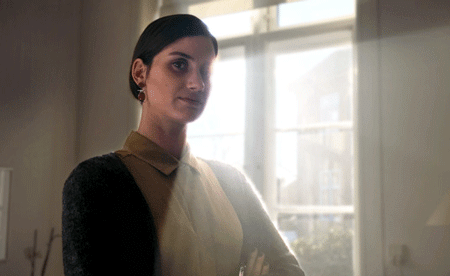You open the refrigerator. You see an immensely tempting birthday cake and reach out to take the teeniest bite from the forbidden goody. But your mother is there, too…
For the third year running, the Cannes Festival market has invited a number of innovative companies to present their takes on the future of cinema. Among the 15 production companies in this year's NEXT programme are the Danish filmmaking partners Johan Knattrup Jensen and Mads Damsbo, who recently served Danish and international audiences the virtual-reality dining experience "The Doghouse."
At this year's festival, the two Danes' production company, Makropol, is world-premiering a taste of a VR feature they are developing, "Ewa" – specifically, an eight-minute chapter titled "Ewa: Out of Body."
Like "The Doghouse," this chapter is set in an imaginary space. Wearing an Oculus Rift-type VR headset, you get to look at the world through Ewa's eyes. You can look around and down your body, feeling like you're inside Ewa's body and moving around as her.
The planned feature will follow Ewa from birth through childhood and up to adulthood where, to become a free woman, she has to confront her worst enemy – her mother, played by Danica Curcic.
"It's a family thriller," Knattrup Jensen, who directed, says. "In 'Ewa,' we want to create a cinematic experience of being another person. Ewa is a woman with a strong will. Through her, we experience a story about setting yourself free as a person, no matter the cost. She's a complex individual and hides a few demons deep inside that she has to find the courage to confront.
"The film at this point is no longer something that hangs on the wall. It's a world you slip into. You get another physique, another way of moving. You might even start thinking differently. The experience is powerful and you forget yourself, completely. Like an intense love affair, deep meditation or a great buzz."
Testing VR in the Feature Film Format
In projects like "The Doghouse" and the new chapter, "Ewa: Out of Body," the filmmaking duo has been exploring the possibilities of VR in short formats. They now feel ready to have a go at a feature-length project.
"'The Doghouse' runs eighteen minutes times five characters. That's 90 minutes combined. The response has been strong. But we want to create unshakable experiences. We want the audience not just to feel like a guest in another person's body, but to be that person. That takes longer sequences. It's important that the audience gets the feel of Ewa, gets to know her like they know themselves," Knattrup Jensen says.
"The story of Ewa is about being a witness to your own life, feeling like a spectator watching your life without really being in control of it. Then it makes sense to work with virtual reality. The POV device can do magical things, especially when you get so close you feel like you’re actually looking out the character's eyes. You feel controlled. Like you're a prisoner in your own body. That's how Ewa feels. You're a passenger, a witness. On the one hand, it can be a relief not to be responsible for your own life. On the other hand, it's claustrophobic. You want to get out, be free."
Developing the Cinematic Language
For Makropol, VR isn't a technological curiosity or just for gamers. Knattrup Jensen sees it as a development of the language of cinema.
"From the beginning, film has been a partnership between technology and aesthetics. We've now come to the next step. Working with our partners, Mads and I are developing the cameras we need to make the film we want we want to make. Custom-made cameras and VR headsets give us an opportunity to teleport the audience in ways that weren’t possible before. It’s a special technology for a special film. Other films need other technologies," he says.
"Because VR is so new and only a few filmmakers have tried their hand at it, everything needs to be redefined: camera movements, cuts, acting, narrative devices. Even the way you talk about films needs to evolve. The beautiful thing, of course, is that we get to put in our two cents, our ideas about how to define it. It’s like a childhood dream, getting to be part of developing a whole new cinematic language."
Making "The Doghouse" gave them experiences that help determine the new language, Knattrup Jensen says.
"Putting on the headset can feel like an ego trip, but when you experience something that powerfully, you want to share it with others, gladly with someone who has had the same experience. All we need to do, really, is not get in the way of that desire. We just need to make sure that the space for sharing experiences is there and that it’s being respected."
Knattrup Jensen believes the technology is so developed now, and has been for a while, that it's mainly a matter of imagination and the courage to invest in content for VR.
"In terms of content, we still have a long way to go. I see our finest task as taking VR from initial fascination to actual storytelling. If I can create an experience for people that expands their world and stays with them like a physical memory, the audience will come," he says.
"Ewa: Out of Body" is written and directed by Johan Knattrup Jensen and produced by Mads Damsbo for Makropol. The development so far has been paid out of pocket. Their previous project, "Skammekrogen," which is also screening in NEXT, is supported by New Danish Screen. Screenings of the 15 projects in NEXT will take place on Monday-Tuesday, 16-17 May.
